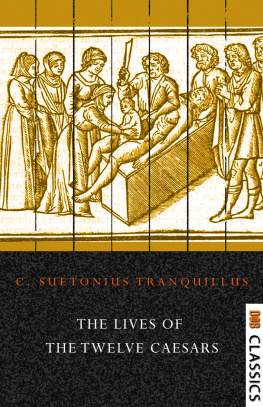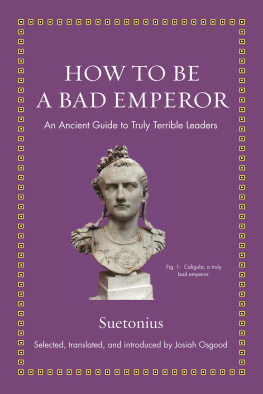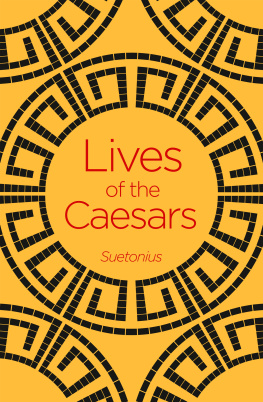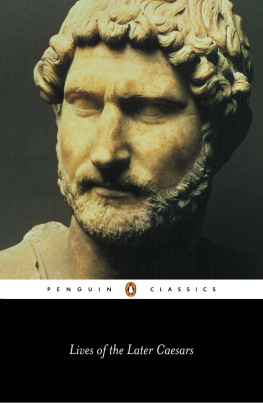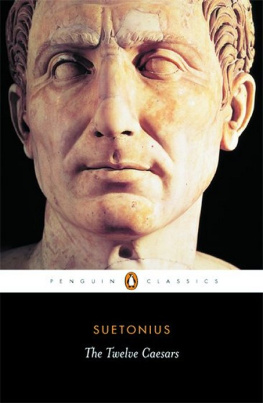Edwards Catharine - Suetonius: lives of the Caesars
Here you can read online Edwards Catharine - Suetonius: lives of the Caesars full text of the book (entire story) in english for free. Download pdf and epub, get meaning, cover and reviews about this ebook. City: Rome;Rome (Empire, year: 2008;2016, publisher: Oxford University Press, genre: Detective and thriller. Description of the work, (preface) as well as reviews are available. Best literature library LitArk.com created for fans of good reading and offers a wide selection of genres:
Romance novel
Science fiction
Adventure
Detective
Science
History
Home and family
Prose
Art
Politics
Computer
Non-fiction
Religion
Business
Children
Humor
Choose a favorite category and find really read worthwhile books. Enjoy immersion in the world of imagination, feel the emotions of the characters or learn something new for yourself, make an fascinating discovery.

- Book:Suetonius: lives of the Caesars
- Author:
- Publisher:Oxford University Press
- Genre:
- Year:2008;2016
- City:Rome;Rome (Empire
- Rating:5 / 5
- Favourites:Add to favourites
- Your mark:
- 100
- 1
- 2
- 3
- 4
- 5
Suetonius: lives of the Caesars: summary, description and annotation
We offer to read an annotation, description, summary or preface (depends on what the author of the book "Suetonius: lives of the Caesars" wrote himself). If you haven't found the necessary information about the book — write in the comments, we will try to find it.
Suetonius: lives of the Caesars — read online for free the complete book (whole text) full work
Below is the text of the book, divided by pages. System saving the place of the last page read, allows you to conveniently read the book "Suetonius: lives of the Caesars" online for free, without having to search again every time where you left off. Put a bookmark, and you can go to the page where you finished reading at any time.
Font size:
Interval:
Bookmark:
OXFORD WORLDS CLASSICS
LIVES OF THE CAESARS
GAIUS SUETONIUS TRANQUILLUS is best known for his Lives of the Caesars, starting with the dictator Julius Caesar and ending with the emperor Domitian, which was published in the reign of the emperor Hadrian (11738 CE). Suetonius was probably born around 70 CE either in north Africa or in Italy. His father, a Roman knight, fought in the civil war of 69 CE. Suetonius himself was educated at least partly in Rome and was a friend of the younger Pliny who obtained a number of favours on his behalf. A fragmentary inscription from north Africa makes clear that Suetonius held a succession of posts at court, working perhaps for Trajan and certainly for Hadrian. He thus had privileged access to the imperial archives as well as the emperor himself. A passage from the anonymous Life of Hadrian records that Suetonius was dismissed for lack of respect to Hadrians wife Sabina.
Besides the Lives of the Caesars, his writings also include On Illustrious Men which survives in fragments (among them short biographies of Virgil, Horace, and Lucan) and numerous other scholarly works now almost entirely lost. Suetonius probably died some time after 130.
CATHARINE EDWARDS is Senior Lecturer in Classics and Ancient History, Birkbeck College, London. Her writings include The Politics of Immorality in Ancient Rome (Cambridge, 1993) and Writing Rome: Textual Approaches to the City (Cambridge, 1996).
OXFORD WORLDS CLASSICS
For over 100 years Oxford Worlds Classics have brought readers closer to the worlds great literature. Now with over 700 titlesfrom the 4,000-year-old myths of Mesopotamia to the twentieth centurys greatest novelsthe series makes available lesser-known as well as celebrated writing.
The pocket-sized hardbacks of the early years contained introductions by Virginia Woolf, T. S. Eliot, Graham Greene, and other literary figures which enriched the experience of reading. Today the series is recognized for its fine scholarship and reliability in texts that span world literature, drama and poetry, religion, philosophy and politics. Each edition includes perceptive commentary and essential background information to meet the changing needs of readers.
Refer to the to navigate through the material in this Oxford Worlds Classics ebook. Use the asterisks (*) throughout the text to access the hyperlinked Explanatory Notes.
OXFORD WORLDS CLASSICS

SUETONIUS

Translated with an Introduction and Notes by
CATHARINE EDWARDS


Great Clarendon Street, Oxford OX2 6DP
Oxford University Press is a department of the University of Oxford.
It furthers the Universitys objective of excellence in research, scholarship,
and education by publishing worldwide in
Oxford New York
Athens Auckland Bangkok Bogot Buenos Aires Calcutta
Cape Town Chennai Dar es Salaam Delhi Florence Hong Kong Istanbul
Karachi Kuala Lumpur Madrid Melbourne Mexico City Mumbai
Nairobi Paris So Paulo Shanghai Singapore Taipei Tokyo Toronto Warsaw
with associated companies in Berlin Ibadan
Oxford is a registered trade mark of Oxford University Press
in the UK and in certain other countries
Published in the United States
by Oxford University Press Inc., New York
Catharine Edwards 2000
Database right Oxford University Press (maker)
First published as an Oxford Worlds Classics paperback 2000
Reissued 2008
All rights reserved. No part of this publication may be reproduced, stored in a retrieval system, or transmitted, in any form or by any means, without the prior permission in writing of Oxford University Press, or as expressly permitted by law, or under terms agreed with the appropriate reprographics rights organizations. Enquiries concerning reproduction outside the scope of the above should be sent to the Rights Department, Oxford University Press, at the address above
You must not circulate this book in any other binding or cover
and you must impose this same condition on any acquirer
British Library Cataloguing in Publication Data
Data available
Library of Congress Cataloging in Publication Data
Data available
ISBN 9780199537563
3
Typeset in Ehrhardt
by RefineCatch Limited, Bungay, Suffolk
Printed in Great Britain by
Clays Ltd, St Ives plc
SUETONIUS Lives of the Caesars, starting with Julius Caesar and ending with the Emperor Domitian, has always had its place as a source of extraordinary tales of imperial viceand at times of imperial virtue. Suetonius presents us with shocking accounts of Caligulas plan to make his horse consul (Cal. 55) and of Nero singing while Rome burns (Nero 38), as well as with edifying descriptions of Augustus splendid redevelopment of the city of Rome (Aug. 2830) and Titus decision to put the state before his love for Berenice (a phrase from of Suetonius Life is said to have inspired Racines Brnice). Centuries later rulers might aspire to being hailed as another Augustus or Titusand dread being labelled another Caligula or Nero.
More recently, while some readers have continued to enjoy Suetonius as a fund of fascinating, indeed, sometimes outrageous anecdotes, many have chosen to treat him as a rather frustrating and untrustworthy source of facts about Roman emperors, which the modern scholar needs to correct (as far as possible), supplement, and rearrange, if a coherent biographical narrative is to be produced. However, to read Suetonius in this way is perhaps to miss his significance. Suetonius himself certainly offers little in the way of chronological narrative and it would be rash to rely on the factual accuracy of the stories he tells about the Caesars. But what he has to say about the eccentricities and achievements of emperors, their virtues and vices, gives us valuable insights into ancient Roman debates about imperial power and how it should be exercised.
The kings of Rome had been driven out by the first Brutus, according to Roman myth, and, under the republic, Romans saw themselves as fiercely opposed to monarchy. Yet, while Julius Caesar met a bloody end for his autocratic pretensions, his heir Augustus was able to establish one-man rule and pass his position on to his heir. How was it possible for one man to control public affairs yet not be king? Even that master of public relations Augustus seems sometimes to have misjudged his subjects expectations, as Suetonius account reveals (see e.g. ch. 70). A century after Augustus death (when Suetonius was writing), the question of how an emperor should behave was still a vexed one. This issue is a central concern in Suetonius Lives.
Gaius Suetonius Tranquillus, born around 70 CE, was of an equestrian family (see Roman knight in Glossary), perhaps from Hippo Regius in North Africa, possibly from Italy itself. His father served as a military tribune in the Thirteenth Legion during the civil wars of 69 CE (Otho 10). Suetonius was educated partly in Rome, spending some time in the rhetorical schools, before embarking on a public career. He secured a posting to Britain as military tribune, around the year 110 or 111, through the patronage of the younger Pliny, but did not take it up (Pliny,
Next pageFont size:
Interval:
Bookmark:
Similar books «Suetonius: lives of the Caesars»
Look at similar books to Suetonius: lives of the Caesars. We have selected literature similar in name and meaning in the hope of providing readers with more options to find new, interesting, not yet read works.
Discussion, reviews of the book Suetonius: lives of the Caesars and just readers' own opinions. Leave your comments, write what you think about the work, its meaning or the main characters. Specify what exactly you liked and what you didn't like, and why you think so.

